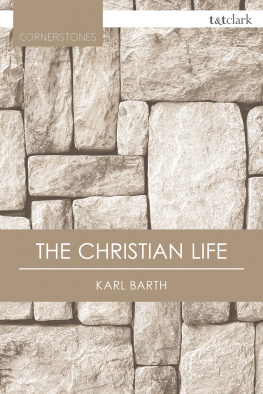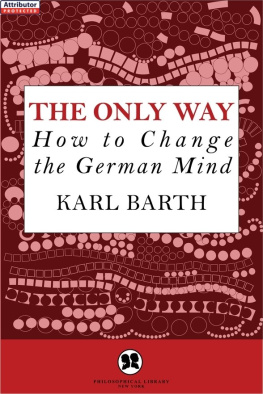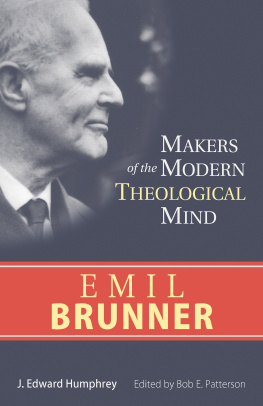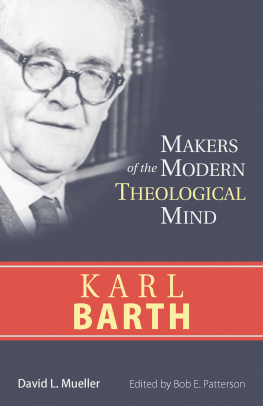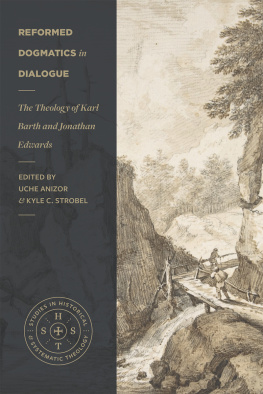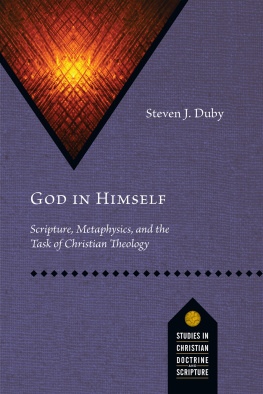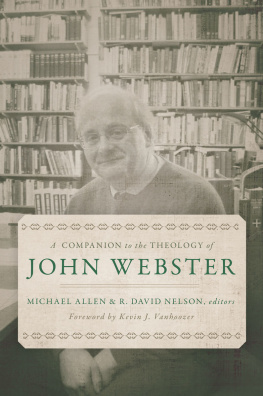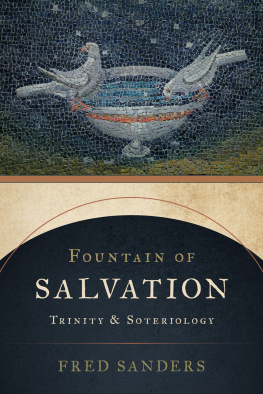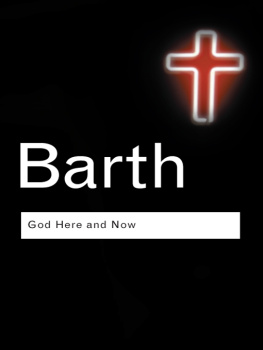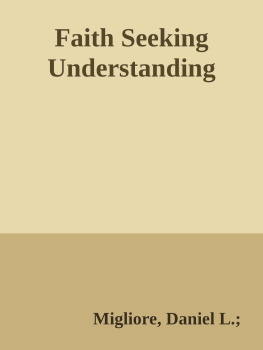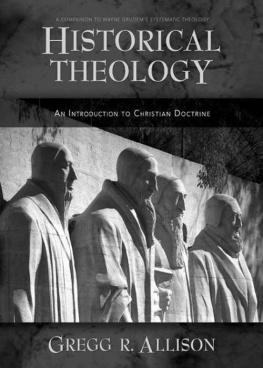The Christian Life
Other Titles in the Cornerstones Series
The Israelite Woman by Athalya Brenner-Idan
In Search of Ancient Israel by Philip R. Davies
Neither Jew nor Greek by Judith Lieu
Sanctify Them in the Truth by Stanley Hauerwas
Solidarity and Difference by David G. Horrell
One God, One Lord by Larry Hurtado
Ancient Israel by Niels Peter Lemche
Jesus: Miriams Child, Sophias Prophet by Elisabeth Schssler-Fiorenza
The Pentateuch: A Social and Critical Commentary by John Van Seters
The Christian Doctrine of God by Thomas F. Torrance
Paul and the Hermeneutics of Faith by Francis Watson
Fragmented Women by J. Cheryl Exum
Word and Church by John Webster
The Christian Life
Karl Barth
Bloomsbury T&T Clark
An imprint of Bloomsbury Publishing Plc

Contents
Chapter XVII
The Command of God the Reconciler
When Karl Barth retired at the age of 75, he was at work on the continuation of Volume IV of the Church Dogmatics and it was hoped that the fourth part of this, the Ethics of Reconciliation, would soon appear. Various factors combined to frustrate this hope. Barth interrupted his normal course to give the series on Evangelical Theology, which he then repeated in part on his American tour. After his return, retirement disrupted his established routine. Medical problems then sapped him of the vigor and concentration he needed for more exacting tasks. He was also not satisfied that he had found the best way to organize his material in the important central sections between baptism as the foundation of the Christian life and the Lords Supper as its renewal. He hesitated in particular between faithfulness as the leading concept, invocation of God, which would produce an exposition of the Lords Prayer, and gratitude, which would enable him to develop his thoughts according to the familiar fourfold relation to God, others, self, and the world.
In the event, then, Barth prepared for official publication only the section on baptism, which appeared in the series of the Church Dogmatics as a Fragment of Volume IV,4. For the rest, he was unable even to complete the central sections, let alone revise them to his satisfaction, and he never even began the concluding eucharistic section. Nevertheless, he left behind several hundred pages of typescript, and with the decision to publish a complete Swiss edition of all his writings these were finally made available to the public and are now presented in this English translation.
The translation reproduces faithfully and, it is hoped, readably, the reflections of the later Barth on the relation between ethics and reconciliation and then on the Christian life as invocation according to the address and the first two petitions of the Lords Prayer. It should be noted, however, that there has been some compression of the very competent and painstaking editorial work done in the original version. Only a sampling is given (in the first pages) of the mostly minor variations in the available text, some of the more indirect allusions have not been documented, and while biblical and non-biblical references not given by Barth have usually been supplied in special brackets[] or in footnotes, full quotations that Barth did not include in his own text have been eliminated. Naturally this implies no criticism of the excellent Swiss editing; it simply avoids an expansion which is hardly necessary when scholars who might be interested in such matters have the data at hand in the original. The translation of the Swiss Preface will facilitate an understanding of the editorial procedures adopted and the apparatus is reproduced in full in the pieces that comprise the Appendix.
For general readers, it is hoped that even though fragmentary, and not wholly satisfactory to its author, this discussion of the Christian life as invocation will both document and promote the concerns of the later Barth for the churchs work and witness in the power and context of the reconciling work of God.
Pasadena
Michaelmas 1980 Geoffrey W. Bromiley
Karl Barth did not finish his Dogmatics. He never wrote the projected Volume V, which would have expounded the doctrine of redemption; also missing is the greater part of the ethics of reconciliation, which would have completed Volume IV. A self-contained fragment of IV,4, which was planned as The Command of God the Reconciler and would have constituted Chapter XVII, was published in 1967 under the title Baptism as the Foundation of the Christian Life (E.T. 1969). Further fragments of this ethical chapter are to be found in the literary remains, although even with the doctrine of baptism they would have formed less than half of CD IV,4. These fragments are published in the present volume.
We have first an introduction to the ethics of reconciliation in the section Ethics as the Task of the Doctrine of Reconciliation (74). Following the doctrine of baptism (75) is the torso of an exposition of the Lords Prayer, which breaks off after the second petition (7678). This exposition of the Lords Prayer, which would have been the heart of the ethics of the Christian life, was to have been followed by a concluding section on the Lords Supper. The three parts of the theory of Christian conduct in terms of the doctrine of reconciliation would have come together as a whole under the guiding concept of calling upon God. The doctrine of baptism, which precedes the exposition of the Lords Prayer, ends with an understanding of water baptism as the prayer for the Holy Spirit, which is the foundation of the Christian life, while the doctrine of the Lords Supper, which would have concluded the chapter, was to have shown this to be the thanksgiving eucharistia which renews the Christian life. Barth did not originally envision this arrangement of the ethical chapter of the doctrine of reconciliation; it arose by way of a self-correction which he felt he should make when he had already delivered 74 and 75 in lecture form. The process is instructive concerning Barths mode of working, and some hints may be given regarding it.
1. Barth broke off his normal work on CD with the end of his lecturing. He was prevented from continuing, first by the American trip, then by a series of illnesses. But half in jest and half in earnest he had often pointed out that even the continuation of CD, let alone its conclusion, was threatened by the removal of the salutary pressure of having to prepare lectures. One may see in this an indication of the great importance that the author attached to his work as a teacher in Basel. It was as a professor that he was a doctor of the church. The texts of CD came into existence first in connection with the lectures, in which students would be introduced in a given semester to some portion of dogmatics or ethics. This shaped the subsections of CD, the parts being so planned in relation to the whole that students could always have the whole in view. It is thus no accident that the exposition of the Lords Prayer found in the remains breaks off at the point where Barth ended his lectures, while the already completed lectures on baptism were later revised and prepared for publication. In the year before his death, Barth often considered doing further work on the doctrine of the Lords Supper, though he left no drafts of this. As he said verbally, he would have liked to present his view of the so-called sacraments within the context of CD. In contrast, however, there were no plans for the continuation of the exposition of the Lords Prayer. The pieces found in the remains certainly have technical markings for printing, but they had not been revised for publication. Apart from uncorrected slips, there are many external indications of this, for example, the use of colons and dashes, which is so much greater than is customary in Barths other writings.

